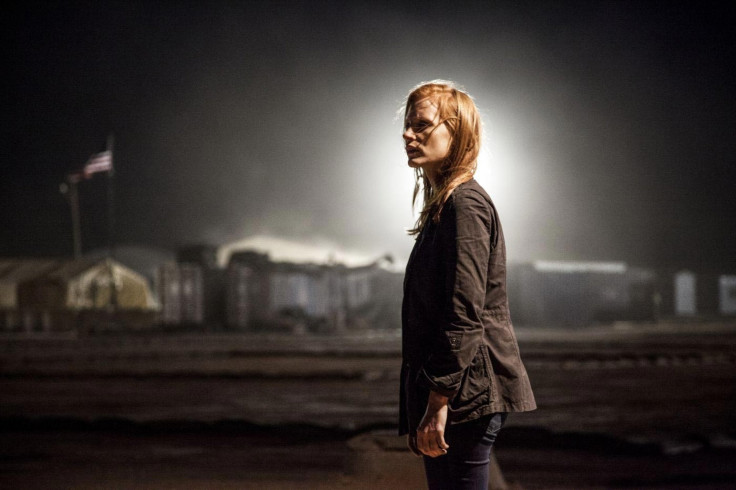Kathryn Bigelow Defends ‘Zero Dark Thirty’; Will Torture Depiction Controversy Subside?

It may be argued that somewhere between audiences' adoration for “Argo” and the uproarious praise for “Les Miserables,” “Zero Dark Thirty” has been drowned out.
Many vehemently believe that the controversial film, which chronicles the 10-year hunt for Osama bin Laden, is pro-torture -- an argument that has somewhat overshadowed the film’s widely acknowledged brilliance.
Early in “Zero Dark Thirty," a member of al Qaeda (Reda Kateb), who is believed to have information pertaining to bin Laden, is beaten, waterboarded and stuffed into a small box. He eventually cracks, providing his interrogator, a CIA operative (Jason Clarke), with the name of the terror mastermind’s courier: Abu Ahmed al-Kuwaiti.
The information he provides plays a part in the discovery of bin Laden’s lair in Pakistan -- and ultimately his execution.
Now director Kathryn Bigelow is once again defending the film, written by former war journalist Mark Boal, in a piece for the Los Angeles Times.
In the statement, published on Tuesday night, Bigelow stuck to her position that “depiction is not endorsement.”
“On a practical and political level, it does seem illogical to me to make a case against torture by ignoring or denying the role it played in U.S. counter-terrorism policy and practices,” she said.
“Experts disagree sharply on the facts and particulars of the intelligence hunt and doubtlessly that debate will continue,” Bigelow added. “As for what I personally believe, which has been the subject of inquiries, accusations and speculation, I think Osama bin Laden was found due to ingenious detective work. Torture was, however, as we all know, employed in the early years of the hunt. That doesn't mean it was the key to finding bin Laden. It means it is a part of the story we couldn't ignore. War, obviously, isn't pretty, and we were not interested in portraying this military action as free of moral consequences.
“Bin Laden wasn't defeated by superheroes zooming down from the sky; he was defeated by ordinary Americans who fought bravely even as they sometimes crossed moral lines, who labored greatly and intently, who gave all of themselves in both victory and defeat, in life and in death, for the defense of this nation,” she concluded.
Over the past few months, it seems everyone from Sen. John McCain to Human Rights Watch has had something to say about the implications presented in the film.
Matt Taibbi of Rolling Stone alleged “'Zero Dark Thirty' Is Osama bin Laden's Last Victory Over America,” while Alex Gibney’s Huffington Post piece “Zero Dark Thirty's Wrong and Dangerous Conclusion” contested the facts presented in the film, arguing that torture may have actually delayed bin Laden’s capture.
Entertainment Weekly’s Owen Gleiberman has defended “Zero Dark Thirty,” noting that film serves as an ugly admission of the unsettling lengths that America had to go through to avenge the 9/11 attacks.
“To me, that makes ‘Zero Dark Thirty’ not an apology for torture so much as a powerful acknowledgement that we might never have found and killed Osama bin Laden without the willingness to enter the fog of war,” he said.
As Gleiberman notes, the argument over whether torture was used to net bin Laden began before the film went into production.
Last April, Jose Rodriguez, the former head of the CIA Counterterrorism Center, released the memoir “Hard Measures: How Aggressive CIA Actions after 9/11 Saved American Lives,” in which he claimed that tactics like waterboarding, which the U.S. has deemed a war crime when others do it, were indispensable when it came to locating bin Laden.
A similar claim was made by the chairman of the House Homeland Security Committee, Rep. Peter T. King, R-N.Y., following the terrorist’s death.
In the 2011 New York Times piece “Bin Laden Raid Revives Debate on Value of Torture,” reporters Charlie Savage and Scott Shane presented various accounts on the matter, including one from Glenn L. Carle, a retired CIA officer who said that brutal interrogations “did not work.”
The debate over “Zero Dark Thirty” has arguably damaged the film’s awards season prospects. Bigelow was snubbed for a Best Director Oscar, and the Best Picture race seems to be among “Argo,’ “Les Miserables” and “Lincoln.”
Last week, Academy member David Clennon posted a statement via truthout.org purporting that the film promotes an “easy tolerance” of torture and calling for an Oscar boycott.
But the dust may be lifting.
During the Golden Globes ceremony on Sunday, Amy Poehler made light of the arduous debate over the film.
“I haven't really been following the controversy over 'Zero Dark Thirty,' but when it comes to torture, I trust a woman who spent three years married to James Cameron."
The film also topped the box office this past weekend, taking in roughly $24 million.
© Copyright IBTimes 2024. All rights reserved.





















